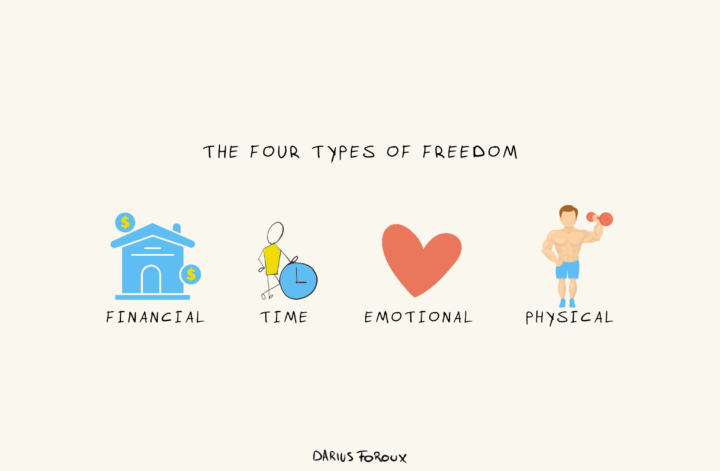My parents bought their first house in 2000. My mother told me that one of their family members broke ties with my parents because of that.
Certain people think that buying a house is not for everyone. Those types of people also believe that higher education is not for everyone. Or that owning stocks is only for rich folks.
These are examples of mental barriers.
So many of us have false beliefs about money and life. And those false beliefs can prevent us from ever living a good life. This is where Stoicism and mindfulness can help us.
By becoming more self-aware, we can prevent ourselves from falling into the trap of mental barriers.
Let me share 7 mental barriers that I had to overcome in my life.
1. Believing that you can’t do something
I grew up in an area with low socioeconomic status. Everyone around me was struggling financially. And I could feel a sense of hopelessness everywhere.
At school, on the playground, and even at home.
But I always refused to be like that. This might sound weird, but my mindset started changing when I discovered 2Pac when I was about 12 years old.
I loved his ambition and unwavering belief in himself. He inspired me to be ambitious in life. If Tupac did it, I could do it too. That was my first experience with outside inspiration.
The Stoic philosopher, Epictetus, also pushed his students to be more ambitious. He once said:
“How long are you going to wait before you demand the best for yourself and in no instance bypass the discriminations of reason?”
I learned that you don’t always need to have successful people in your environment. You can listen to them or read their words and still be inspired.
2. Being jealous of others
My cousin and I are the same age. We grew up together. But in high school, I started getting better grades. And they moved me to a “better” school. The problems started from the day they did that.
He started resenting me. Jealousy is something that has destroyed many people’s relationships. It’s the cause of a lot of people’s unhappiness.
You can’t be jealous and happy. You might get rich. But you will never be content. Get rid of jealousy.
Try to wish everyone well. When you really think about it, wanting the best for others doesn’t bring you any negative impact. Instead, it allows you to be genuinely free.
And you can focus more on improving yourself.
3. Fear of taking risks
Look, everything in life is risky. Especially when it comes to money. Even the lowest-risk stock market investing strategy is still not risk-free. There’s always a risk that the world gets into a nuclear war and everything ends.
But we must not be a doomsday thinker.
Doing uncomfortable things is always scary. I remember the first time I decided to invest in stocks. It was terrifying. The fear of losing money was overwhelming, but I knew that if I let fear control my decisions, I would never progress financially.
Overcoming this mental barrier required me to shift my perspective on risk. The philosopher king, Marcus Aurelius, said it best:
“There is a limit to the time assigned to you, and if you don’t use it to free yourself it will be gone and will never return.”
I started seeing it as an opportunity for learning and growing rather than something to be avoided.
This shift hasn’t made taking risks easier, but it has made them worthwhile.
4. Thinking wealth is evil
The notion that “money is the root of all evil” is a common misconception that can hold you back from achieving financial success.
I used to believe this too, until I realized that money itself isn’t evil—it’s just a tool. It’s how you use it that matters.
Wealth can be used to create opportunities, support causes you care about, and provide for your loved ones.
Recognizing this helped me see the pursuit of wealth as something positive, not something to shy away from.
5. Believing you’re not smart enough
Intelligence isn’t just about IQ—it’s also about emotional intelligence, creativity, and plain old common sense.
While I did get good grades in school, I was never the best. I never finished even remotely close to the top of the class.
But I had something else: A relentless drive. I just kept going.
If I failed an exam, I would study hard until I finally understood the material.
Remember that academic performance isn’t the only indicator of intelligence or potential for success.
Believing you’re not smart enough can prevent you from pursuing opportunities and taking chances.
Don’t let this hold you back. Everyone has unique strengths—discover yours and use them to your advantage.
6. Overvaluing comfort
Comfort always feels nice, but it doesn’t lead to growth. I used to value comfort over everything else, but this mindset kept me stagnant.
Once I started pushing myself—taking on challenging projects, learning new skills, investing in stocks and real estate—I started to see real progress. Seneca said it well:
“No man is more unhappy than he who never faces adversity. For he is not permitted to prove himself.”
Don’t let the need for comfort keep you from pursuing your financial goals. Embrace discomfort as a sign of growth.
7. Not believing in your worth
The most difficult barrier I had to overcome was not believing in my worth. I used to undersell my skills and downplay my achievements.
And to be 100% honest with you, I still tend to do that.
But every time I get that feeling, I remind myself of the value I can bring to the table. And this is true for every person with a positive mindset.
If you don’t believe in your ability to provide value to the world, you will always sell yourself short. You will settle for work and things that don’t appreciate you.
As long as you’re constantly improving and putting in the work, you’re worth WAY more than you think.
Don’t be afraid to (modestly) ask for what you deserve. This is not about arrogance. It’s about being real.
That’s it! These mental barriers can prevent us from achieving financial success.
But by using ancient wisdom, we can identify them. Then we can begin to dismantle these barriers and allow ourselves to be truly free and successful.




